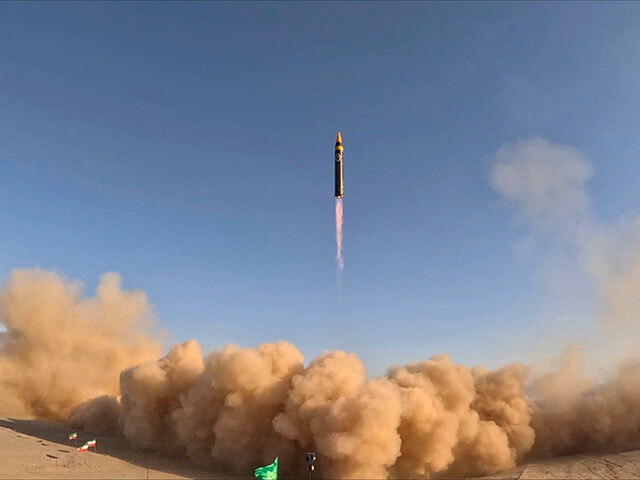Iranian Foreign Ministry spokesman Nasser Kana’ani told reporters on Monday that his regime is ready to “resume negotiations” with the United States if President Joe Biden returns to the 2015 nuclear deal signed by predecessor Barack Obama.
Any negotiations between Tehran and Washington must hinge on the return to that agreement, the spokesman said, but talks would only be limited to implementing the provisions of the deal.
“If the other side shows its readiness to return to the JCPOA, Iran is ready to help in this regard,” Kana’ani asserted.
The remarks follow the spokesman’s boss, Foreign Minister Hossein Amir-Abdollahian, telling reporters during a visit to the United Nations headquarters in New York last week that his government is “serious about returning to the” deal and reports, later denied in Tehran, claiming that Supreme Leader Ayatollah Ali Khamenei had greenlit “direct talks” with America.
It also follows the suspension of Biden’s top envoy on Iran issues, Robert Malley, and the suspension of his security clearance. Reports have suggested Malley had “mishandled” classified information or potentially fallen within the sphere of an Iranian regime influence operation, though the U.S. government has not confirmed any such report.
Iran is a rogue state, the world’s preeminent state sponsor of terrorism, and its government is openly dedicated to the destruction of America. Despite this, President Obama signed an agreement with Iran in 2015 in conjunction with the other four permanent members of the United Nations Security Council – China, Russia, the United Kingdom, and France — as well as Germany, a group known as “P5+1.” The agreement, known as the “Joint Comprehensive Plan of Action” (JCPOA), granted Iran relief from sanctions related to its illegal nuclear development worth $150 billion and banned American inspectors from joining International Atomic Energy Agency (IAEA) teams tasked with ensuring Iran was upholding its end of the deal. The Obama administration at the time conceded that Iran would use “some portion of that money” from sanctions relief to fund terrorist activities across the Middle East.
Former President Donald Trump exited the agreement in 2018 on the grounds that Iran had routinely violated the deal’s limits on its nuclear development and the JCPOA was “defective at its core.” Withdrawing America from the agreement restored the sanctions previously imposed on Iran before 2015.
The Iranian Foreign Ministry spokesman told reporters on Monday that, five years later, Iran would embrace America’s return to the deal.
“If the U.S. returns to the Iran nuclear deal in a resolute and responsible manner, we are ready to fulfill our responsibilities and resume negotiations,” Kana’ani, the spokesman, said according to a translation by the Chinese state television network CGTN. “However, the negotiations will only be related to the nuclear deal and won’t limit Iran’s other diplomatic efforts.”
The Iranian government’s Fars News agency reported that Kana’ani vowed support for restructuring the agreement – which currently exists in moribund form between Iran and the five remaining countries – to include Washington again.
“If the other side shows its readiness to return to the JCPOA, Iran is ready to help in this regard,” he said.
Amir-Abdollahian, the foreign minister, made similar comments in New York last week.
“If the other parties are ready, we are serious about returning to the JCPOA,” he claimed.
Asked about the Iranian Foreign Ministry briefing on Monday, State Department spokesman Matthew Miller said the Biden administration considers “diplomacy is the best option” to resolve the ongoing threat of Iran’s illicit nuclear program, but claimed Iran – not the United States – was “a long way off” from restoration of the nuclear agreement.
“We will continue to urge Iran to take de-escalatory steps. I think we are a long way off from Iran even considering re-entering the JCPOA, given that they just in the past few weeks refused IAEA inspectors,” Miller said. “So our policy hasn’t really changed. We’re committed to ensuring that they do not have a nuclear weapon.”
“We’re committed to diplomacy to constrain Iran’s nuclear program, but we have not yet seen them take the kind of de-escalatory steps that we think are important for them to take,” Miller concluded.
The Biden administration has faced years of reports claiming the president is seeking to restore the JCPOA or construct a new, but similar, agreement. Biden fed those reports with attempts to insert himself into ongoing JCPOA consultations between Iran and the remaining parties. In April 2021, Biden sent Malley, then his top envoy on the Iran issue, to Vienna, Austria, while one such consultation occurred. Malley was not invited to the talks and, humiliatingly, stayed at a nearby hotel in the city with the hopes of potentially running into the invited participants.
“No representative from the United States will attend the Joint Commission meeting or related expert meetings and no direct and indirect negotiations with the United States are on the agenda of Iran’s delegation,” the Iranian Foreign Ministry insisted following the news at the time of Malley’s travel to Vienna.
A year ago, Amir-Abdollahian, the foreign minister, claimed that Biden was “in a hurry to reach the agreement” for a new nuclear deal, accusing White House negotiators of sounding tough in public and being “contradictory” in private.
Malley’s fate remains a major unknown factor in future Biden administration negotiations with Iran. Malley was placed on leave without pay in June, and reportedly lost his security clearance, at least while investigations continue. Reports published by Iran International and Semafor last week suggested Malley may have been implicated in operations by the Iran Experts Initiative (IEI), an alleged government influence operation seeking access to top government officials as well as prominent academics and public figures.
“I do not have any reason to believe an Iranian influence operation infiltrated the United States Government,” Matthew Miller, the State Department spokesman said on Monday.
“However, as it relates to Rob Malley, that remains an ongoing investigation. So of course, I can’t [comment],” he added.

COMMENTS
Please let us know if you're having issues with commenting.